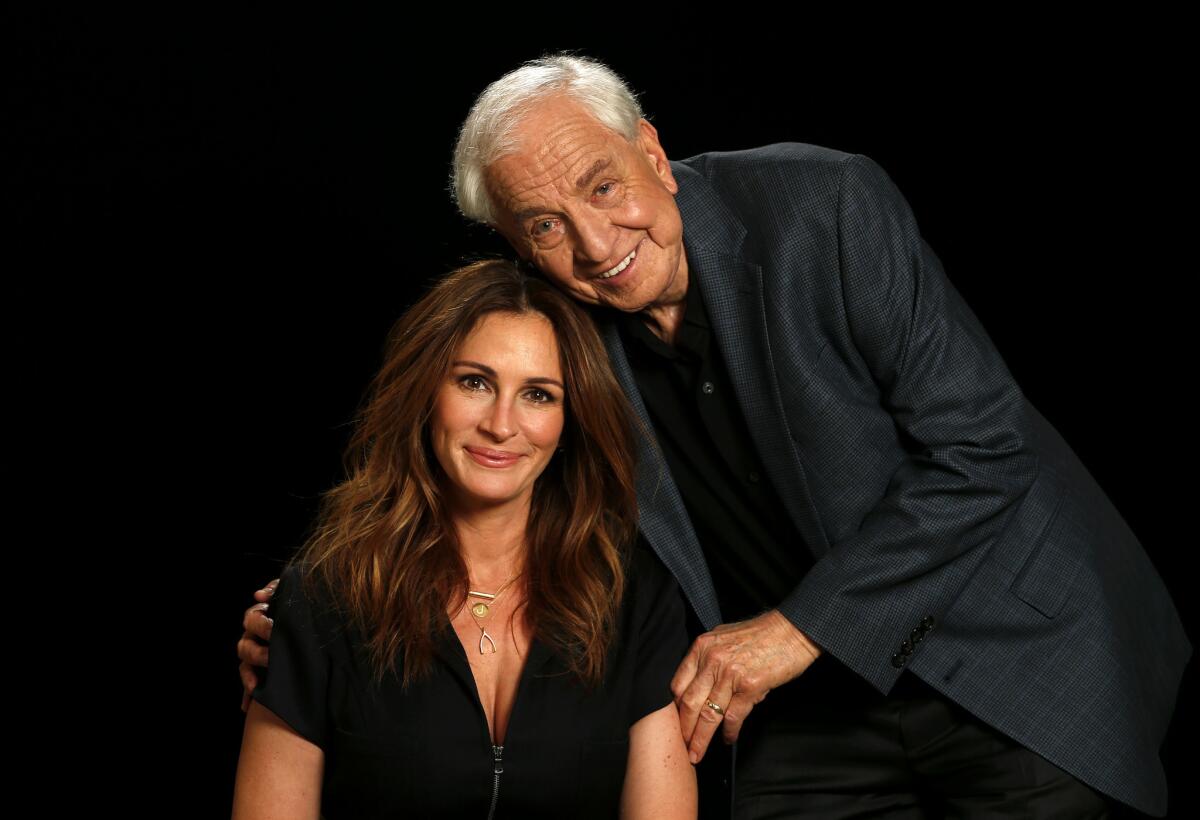Remembering Garry Marshall with hugs and affection

When Garry Marshall died Tuesday, the first person I thought about was Julia Roberts.
The actress was not one of the famed director’s three children, and in fact had no blood relation to him. But after years of working with him, she described herself as one of his “fake kids” — someone whose guidance and deep hugs she sought in the way you would a close relative.
In April, I was able to sit down with the longtime collaborators for an interview about their latest movie together, the romantic comedy “Mother’s Day.” After “Pretty Woman” in 1990 became a global hit, the pair teamed up on three more movies: “Runaway Bride,” “Valentine’s Day” and “Mother’s Day.”
We met at the Sportsmen’s Lodge in Studio City and Marshall arrived first, with little fanfare. He shook my hand and said he’d brought a photo of he and Roberts on the set of “Pretty Woman” for me to look at. It was in a bulky frame, and I thought it was nice he’d carried it all the way to the meeting.
When Roberts, who is 48, walked in, the two hugged for what felt like a minute and then proceeded to sit for the photo session. Even though Marshall was over three decades Roberts’ senior, he seemed more concerned that she was comfortable during the shoot, making sure she got the best angles and was happy with the way she looked.
After the photographer was satisfied, we walked to an empty ballroom overlooking a pond and sat down. There, Roberts clung to his every word. They were particularly affectionate — occasionally, she grabbed his hand, and at one point they even went forehead-to-forehead, staring into each other’s eyes.
“Sometimes when we’re hugging,” she said, “I do feel like I could just start crying. Just because I’m in a safe space.”
Maybe hindsight has clouded my experience, but I do remember feeling like she was treasuring her time with him — that she knew he might not be around that much longer. She’d even said that the reason she signed on to do “Mother’s Day” was because even though the two had traditionally worked together every decade, with the clock ticking, she felt it might be time to speed up the pattern.
“He’s like the ultimate father for everyone in every scenario,” she said, looking at him warmly. “He wants to make sure everyone’s happy and feeling good about themselves. It’s kind of extraordinary. I think about Garry and it’s like he raised me. I grew up on his television shows. My kids watch movies on the weekends — we don’t watch TV during the week. Now, when I was a kid? I got home from school and turned the TV on and it stayed on. ‘Happy Days’ and all those things ... that’s what we were brought up on.”
I could see why Roberts was so drawn to Marshall. I’d spoken to him a few times over the years, almost always about his leading ladies. He never hesitated to jump on the phone to share kind words about them — Lindsay Lohan, Anne Hathaway, Roberts — even when she wasn’t appearing in one of his films. It was obvious he loved women, and he’d often say as much: “I’m Scorpio, Italian and have daughters and sisters. So women are good for me,” he would say with a chuckle.
I liked how unapologetic he was about the movies he made. He knew critics weren’t fans of some of his films, especially his most recent ones that centered on holidays. He laughed off the bad reviews, saying he was happy to have found an unexpected niche in his later years.
Most of the female characters in Marshall’s films were relatable — Hathaway in “The Princess Diaries,” who felt far too awkward to be actual royalty, and even Roberts as a prostitute in “Pretty Woman” — sure, maybe I’ve never been on Hollywood Boulevard after 2 p.m., but what young woman hasn’t hoped an eligible suitor would sweep her off her feet and magically transform her life for the better? Being one of Marshall’s leading ladies meant that you were probably flawed but that it didn’t matter, because someone was always able to find what made you unique and beautiful — worthy of a tiara or a shopping spree on Rodeo Drive.
Toward the end of our interview, I asked Marshall why he was still working at 81, when he could be enjoying life with his wife in their Carbon Beach mansion. His answer, not surprisingly, had to do with women.
“I love to work,” he replied. “[On this film, I knew I was] going to see Julia and this new kid, Britt [Robertson, who played Roberts’ daughter]. I work with a lot of 19-to-22-year-olds. And this sounds very strange, but they need a hug. With no sexual overtones or anything. Just a hug. Actors need a hug too. Hugging is more than it was originally cracked up to be. I have made that a big part of directing.”
Twitter: @AmyKinLA
More to Read
Only good movies
Get the Indie Focus newsletter, Mark Olsen's weekly guide to the world of cinema.
You may occasionally receive promotional content from the Los Angeles Times.






